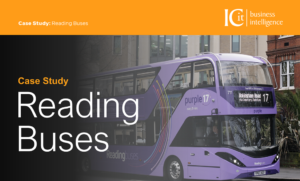Reading Buses

How Workday Adaptive Planning drove finance speed, accuracy, and productivity at 120-year-old transportation company.
Benefits of Workday Adaptive Planning
- A smooth and easy transition from Microsoft Excel
- Improved accuracy and access to key data
- Faster delivery of financial analysis for strategic decision making
- Better motivation and satisfaction across the Finance Team
A shift needed to deliver better accuracy.
Reading Buses Finance Director, Laurence Jenkins, had big plans for the council-owned organisation when he arrived in 2019. Having experienced first-hand the benefits of ERP software whilst at Transport for London, he was determined to move his new team away from unwieldy Excel-based reporting and planning. The process of circulating spreadsheets to around 15 cost centre managers would invariably invite human error and consolidating budgets across the organisation’s multiple businesses took a week for the 12-strong finance team to do manually.
“It was very clunky and time consuming and I was not always convinced of the accuracy of the data, because when things are done manually it’s easy for things to go wrong,” Jenkins explains. “So many people are involved and touching the process.”
However, there was one small hurdle: COVID-19. When the pandemic struck, all plans for a refresh went on hold – but not for long. As customer numbers and finances recovered, it was time to look for a new financial software provider.
Team culture needed to be considered.
Jenkins chose Workday Adaptive Planning after an RFP process that included multiple suppliers. Workday put Reading Buses in touch with their award-winning partner, ICit Business Intelligence, and work began on delivery. Phase one focused around budgeting, and went live in December 2022, followed by a second phase to enhance business reporting.
“This was a big project for us; culturally as much as anything. Half of my team have been here over 20 years and were used to doing things in a certain way. People are quite nervous about change, so we needed that help and guidance from ICit through this implementation,” Jenkins explains.
“They effectively configured bespoke models for staff costs, wage forecasting, fuel utilisation costs and revenue planning. They worked closely with us to develop something powerful and useful for the business.”
“This was a big project for us; culturally as much as anything. Half of my team have been here over 20 years
and were used to doing things in a certain way.”
Laurence Jenkins, Financial Director, Reading Buses
Enhancing the quality of conversations.
The benefits were almost immediate. The ease-of-use and real-time, unified view delivered by Workday has encouraged faster, more regular forecasting – saving a fortnight’s worth of work annually. And consolidating reports across the business can now be done with the click of a button, saving another week’s work each year-end, Jenkins explains.
Workday Adaptive Planning has also a commentary function where cost centre managers can add explanations of variances in key figures.
“As well as benefits to the finance team, it’s driven so much more accountability for the cost centre managers who ultimately are the ones spending the money,” says Jenkins. “This has given them that ownership – there’s nowhere to hide now.”
Overall, time savings thanks to the solution have allowed the finance team to focus on more value-added tasks – “more analysis than processing”, he adds. But beyond the time and money savings, there have also been cultural improvements. Specifically, it has “improved the quality of conversations” between the finance team and the rest of the business. The former is now able to ask more intelligent questions, while senior leaders have a better understanding of the company’s underlying financial health, says Jenkins.
The OfficeConnect feature (Workday Adaptive Planning’s seamless integration with Microsoft Office) has also brought reporting to life, enabling users to provide real-time financial analysis during meetings, to drive business agility. That apparently caught the eye of the company CEO, who was initially sceptical of the project.
“As well as benefits to the finance team, it’s driven so much more accountability for the cost centre managers
who ultimately are the ones spending the money.”
Laurence Jenkins, Finance Director, Reading Buses
Layering efficiencies and delivering against KPIs.
Reading Buses is now in phase three of the project, which will involve layering-in further efficiencies, by putting non-financial data into the solution. This means pulling customer numbers in from operational systems.
“My end goal is to have all of the business KPIs reporting through Workday Adaptive Planning and for that to be the core system for our reporting, not just the financials,” concludes Jenkins. The journey continues.
Ready to find out more?
We have helped many businesses around the UK implement a range of Financial Planning & Accounting features, that are offered by Workday Adaptive Planning for Transport and Logistics industries.
Our team of specialist Workday Consultants can discuss your exact business needs, advise you on how to implement Workday Adaptive Planning within your finance practices and also offer training to those staff who will be using the software day-to-day.
Get in touch today
To find out more about the benefits of Workday Adaptive Planning, or ask any specific questions about how it could improve your current financial software options, please get in touch with us today.
Get in touch



